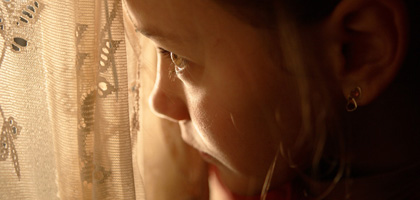Primary navigation

Ireland/Sweden 2008

Reviewed by Brian Dillon
Our synopses give away the plot in full, including surprise twists.
Dublin, the present. Dylan, aged 13, and Kylie, 11, live next door to each other on a suburban housing estate. When Dylan's alcoholic father attacks his mother, the boy hits him over the head with a computer-game console and flees with Kylie, who has found a stash of money under her bed. A harmonica-playing immigrant in charge of a canal dredger takes the children to the city centre; on the way, he introduces them to the songs of Bob Dylan. Kylie and Dylan go shopping for clothes, trainers and sweets. A busker gives them a flyer for a Bob Dylan concert.
At night, they search in vain for Dylan's older brother, who ran away two years earlier. Their money runs out and they are briefly separated when Dylan decides to go home but Kylie refuses. They find each other again when she is pursued by a security guard who has caught her shoplifting. As they hide in an alley, Kylie reveals that she has been sexually abused by her uncle. They continue their journey through the city, until Kylie is snatched from the street and bundled into a car by two kerb-crawling men. Dylan chases the kidnappers and Kylie is freed. Outside a music venue, the children meet a Bob Dylan impersonator, whom they assume is the real thing.
Kylie and Dylan spend the night under cardboard boxes. When they wake, they find they have been sleeping next to the corpse of a homeless man. The children turn themselves in to the police, and are driven back to the estate and their families.
Writer-director Lance Daly's short feature is filled with images that verge on kitsch even as they seem to promise a film of more rigorously poetic or realist intent. Kisses begins and ends in black and white: dead dogs litter the lethal roads around a suburban estate, and a flat grey field fronts the dismal council houses that the young protagonists will soon flee. As they embark on their newly chromatic journey to the heart of Dublin's anomic night, a flight of swans lifts heavily from the canal on which they're travelling. Reeds sigh as their ramshackle boat slinks towards the city. At the centre of Dublin, Dylan and Kylie drift briefly among derelict relics of the industrial past and garish monuments to the city's decade-old (and now swiftly reversing) economic boom, before being thrust into a night-town made of rain-slick and motion-blur. As is ever the temptation with films set in Dublin, the city threatens to vanish into its own mythic sense of itself.
In fact, so enthralled is Daly by the atmospherics of his pubescent picaresque that whole scenes go by in a dialogue-free haze of Christmas lights, rush-hour headlights, wintry Liffey bridges and small faces pressed hopefully against the promise of the city. One has the sense at such moments of a film that could be stranger and more dreamlike than Daly is willing to let it become; instead, these interludes are merely charming where they might have been truly estranging. Kisses aspires to be a kind of fairytale: Kylie and Dylan are guided through the city by the songs and persona of Bob Dylan, whose doppelganger they finally meet in the person of a sibilant and stetsoned Stephen Rea. The children torment each other with tales of the murderous 'Sackman', who is said to bash youngsters' brains out against lampposts. But the mythic structures never take: it's as if Daly is as wary of the unreal, potential city as he is of the realist milieu of monochrome despair that he abandons early on.
Nowhere is this uncertainty more obvious than in the frantic and (in narrative terms) disastrous sequence in which the 11-year-old Kylie is kerb-crawled - "Are you working?" asks a dead voice from inside the car - and then kidnapped on a dark backstreet. We already know that she has been abused by an uncle: we have seen her shrink from him in front of her oblivious mother, and she blurts the details to Dylan in the dark. It's truly dispiriting, then, that having established Kylie's real reason for leaving home, Daly should proceed to squander the knowledge in a ludicrous chase scene involving shadowy paedophiles pursued at speed by the plucky Dylan. Add to that a short lecture from an immigrant woman on the subject of the kiss as selfless gift - thus charging the children's eventual kiss with damp sentiment - and you have a film that shows a weird disregard for the integrity of its protagonists' experience.
What saves Kisses from stylistic confusion and somewhat clunky second-guessing of its own characters is the quality of the two leads' performances. Shane Curry and Kelly O'Neill are rarely less than riveting as the furious, abashed, fitfully romantic Dylan and the outwardly fearless, resourceful Kylie. With their respectively sulky and smirking charm, they even manage to pull off Daly's frankly mawkish final scene, in which everything turns on a blown kiss as the two children return to their unwelcoming families. For all its lapses, Kisses at least leaves this impression: of childish aspirations secretly shared, however briefly.